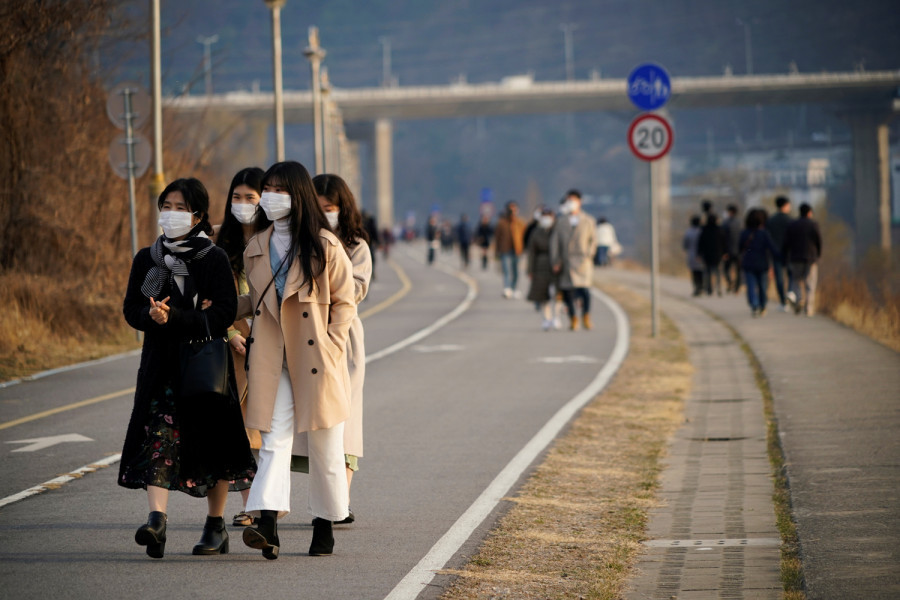National
Worker departures for South Korea may resume soon
The East Asian country has shown interest to take in Nepali workers, but with conditions.
Chandan Kumar Mandal
After a wait of over 16 months, a glimmer of hope has emerged for thousands of Nepali workers who have been waiting to reach South Korea to take up jobs there.
South Korean authorities have hinted that they would soon start allowing entry to Nepali workers who remain stuck at home since last year due to the Covid-19 pandemic.
In their recent discussions, Nepali and South Korean authorities have agreed to resume the migration of Nepali workers to the East Asian country in a few weeks.
According to Krishna Prasad Dawadi, director general of the Department of Foreign Employment, the central agency overseeing the foreign employment sector, the Korean side is positive about taking in Nepali migrant workers.
“During our discussions and correspondences, the Korean side has shown a positive intention of taking in Nepali workers in the near future,” Dawadi told the Post. “As international flights have resumed and there are also direct flights between South Korea and Nepal, they must have considered restarting hiring Nepali workers.”
Labour migration to South Korea faced obstructions since the first week of February, 2020 after Covid-19 cases started rising in many countries around the world, including South Korea.
Later in the same month, the migration of Nepali youths to South Korean was temporarily halted after a sharp spike in Covid-19 cases there.
Since then, Nepali workers have not been able to visit Korea although labour migration to several other countries has resumed, following months of suspension owing to the pandemic.
Several thousand Nepali workers, who had passed the Korean language and skills tests and qualified for Korean jobs, were stuck back home running the risk of losing their hard-earned opportunities.
They had also staged demonstrations in Kathmandu to draw the attention of the authorities to take initiatives for resuming labour migration to South Korea.
The latest hope in reopening South Korea for Nepali workers, however, comes with some pre-conditions.
“The Korean side visited us and shared their intention of allowing in Nepali migrants,” said Dawadi. “They also proposed certain conditions for allowing in Nepali workers.”
The conditions proposed are that Nepali workers need to fly to South Korea by direct flights, not through transit, pay for their medical insurance, which will cover the costs of Covid-19 treatment, and pay for the mandatory hotel quarantine fixed by the Korean side.
“After their proposal, we also discussed the matter with Nepali candidates, who are waiting to visit South Korea. They have also agreed to these conditions,” said Dawadi. “The Korean side has verbally informed us that they would take in Nepali workers, but no official decision has been made yet.”
The latest development comes as a glint of hope for nearly 8,000 Nepali migrants, including first-timers and returnees, who have contracts for their second stints in Korea, according to government data.
Nepali migrants, who have been waiting to reach South Korea since last year, have not only welcomed the recent development but have also agreed to abide by the conditions set by the Korean side.
“We are aware of the latest discussions about resuming labour migration to South Korea. We are also informed about the pre-conditions and we are ready to follow them,” said Ajay Sodari, a Korean job aspirant originally from Ghodaghodi Municipality, Kailali, told the Post. “Most of the people I know are ready to go by direct flight, pay for medical insurance and quarantine facilities in South Korea.”
Sodari was among the 6,773 individuals who cleared both the language test and the skill test to get a job in Korea in 2020 under the Employment Permit System (EPS). However, before he could fly to Korea, Covid-19 struck and his dream of working in Korea was dashed.
Candidates like Sodari have been thronging the government agencies like the Ministry of Labour, Employment and Social Security, the Department of Foreign Employment and the Employment Permit System (EPS) Korea Section to inquire about their prospects of reaching South Korea, since last year.
“Even on Monday, we met the secretary of the Labour Ministry and director general of the Foreign Employment Department,” said Sodari. “After a long wait of 16 months and frequently meeting government agencies, we are seeing some hope this time. The new conditions will add up the financial burden on us, but we are ready to bear them.”
Nepalis are waiting to reach South Korea agreeing to bear the additional cost also because the East Asian country remains a preferred destination for aspiring Nepali workers for its better pay, safety and other facilities compared to the countries in the Persian Gulf.
According to Nepal government statistics, more than 65,000 Nepali workers have gone to South Korea since 2008 under the EPS.
Starting from January this year, the minimum wage in South Korea has been hiked by 1.5 percent from South Korean won 8,590 per hour to 8,720 (approximately Rs892-Rs904) per hour.
But it seems Nepali workers desperate to reach South Korea will have to wait for some more time for the official announcement.
“It is likely that they will take committed workers, who have served in South Korea before, in the first batch, although details are not clear about subsequent groups,” said Dawadi. “It seems that the first group of Nepali candidates will fly to South Korea next month [Shrawan], but there is no fixed date or number of workers they will be taking as of now.”




 16.12°C Kathmandu
16.12°C Kathmandu















